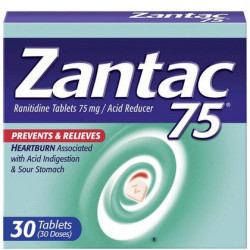Zantac (ranitidine) Coupons, Discounts & Cost
Zantac (ranitidine) is an antiulcer drug for the treatment of certain gastrointestinal diseases. One way to save money on the Zantac retail cost regardless of income and insurance status is to use Zantac coupons or discount cards from RXCoupons. Use this Ranitidine coupon at this online pharmacy and receive up to 75% off the sale price.
What is Zantac?
Zantac (ranitidine) is an antiulcer drug for the treatment of certain gastrointestinal diseases caused by excess stomach acid.
Zantac indications: duodenal ulcer associated with Helicobacter pylori infection, ulcers of the duodenum (including those associated with non-steroidal anti-inflammatory drugs), gastroesophageal reflux disease, postoperative ulcers, chronic episodic dyspepsia, Zollinger-Ellison syndrome, prevention of stress-related stomach ulcers in patients with severe diseases, prophylaxis of duodenal ulcers, prevention of bleeding associated with peptic ulcers, prevention of Mendelson's syndrome during anesthesia.
What should you know about Zantac contraindications?
The main contraindications for Zantac: acute porphyria, pregnancy and breastfeeding; age up to 12 years, hypersensitivity to the components of the drug.
Caution should be used in patients with hepatic and renal insufficiency, cirrhosis.
Drug dosage
Zantac tablets for adult patients:
- Gastric and duodenal ulcers: 150 mg twice a day (morning and evening) or 300 mg once a day (evening) for 4 weeks. The therapy should be extended for another 4 weeks in case of ineffective treatment. A dose of 300 mg twice a day is more effective for the treatment of duodenal ulcers. - Prophylaxis of recurrences of gastric and duodenal ulcers: 150 mg once a day (at night). The dose is increased to 300 mg once a day for smokers. - Ulcers associated with taking NSAIDs: 150 mg twice daily or 300 mg once a day (at night). The course of treatment is 8-12 weeks. - Prophylaxis of ulcers associated with taking NSAIDs: 150 mg twice a day. - Duodenal ulcer associated with Helicobacter pylori: 150 mg twice daily or 300 mg once a day in combination with other drugs. - Postoperative ulcers: 150 mg twice a day for 4 weeks. If there is no clinical effect, then take this drug for another 4 weeks. - Gastroesophageal reflux disease: 150 mg 2 times a day (or once a day at a dose of 300 mg) for 8-12 weeks. - Zollinger-Ellison syndrome: the initial dose is 150 mg 3 times a day. - Prevention of bleeding peptic ulcers: 150 mg twice a day. - Prevention of Mendelson's syndrome: 150 mg in the evening and 2 hours before anesthesia.
Patients with severe renal failure should reduce the dose up to 150 mg once a day.
What should you know about Zantac side effects?
Cardiovascular system: arrhythmia, bradycardia, atrioventricular block; rarely - vasculitis.
Digestive system: dry mouth, nausea, vomiting, abdominal pain, constipation; rarely - hepatitis, jaundice, acute pancreatitis, diarrhea.
Hematopoietic system: thrombocytopenia, leukopenia; rarely - pancytopenia, agranulocytosis, bone marrow aplasia and hypoplasia.
CNS: fatigue, headache, drowsiness, dizziness; rarely - noise in the ears, irritability, blurred vision, hallucinations, confusion, depression.
Musculoskeletal system: rarely - myalgia, arthralgia.
Dermatological reactions: alopecia.
Endocrine system: gynecomastia, decreased libido, amenorrhea; rarely - discomfort in the mammary glands.
Allergic reactions: urticaria, skin rash, bronchospasm, erythema multiforme, angioedema, anaphylactic shock, fever, arterial hypotension, chest pain.
What should you know about Zantac special instructions?
The dose of Zantac should be gradually reduced.
Long-term therapy of weakened patients can cause intoxication.
Patients with severe renal insufficiency need to use lower doses of Zantac.
The effectiveness of therapy is reduced in smoker patients.
Patients should not eat foods, drinks and medicines that cause irritation of the gastric mucosa.
Antacids can reduce the absorption of ranitidine. Immunosuppressive agents can increase the risk of neutropenia.
Zantac suppresses the metabolism of hexobarbital, aminophenazone, calcium antagonists, phenazone, buformin, glipizide, indirect anticoagulants.
Zantac can be stored at temperatures up to 30 °C. Keep this drug away from extreme heat and moisture.

